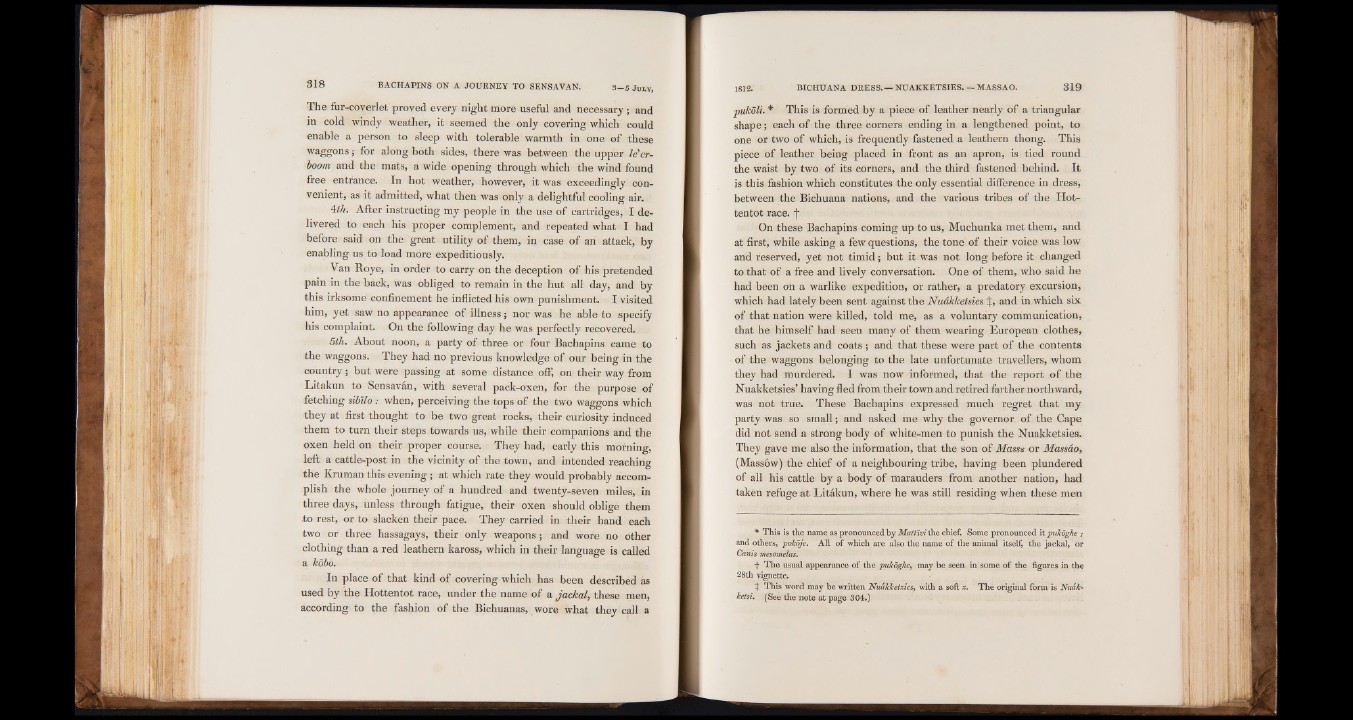
3 1 8 BACHAPINS ON A JOURNEY TO SENSAVAN. 3 - S J u l y ,
The fur-coverlet proved every night more useful and necessary; and
in cold windy weather, it seemed the only covering which could
enable a person to sleep with tolerable warmth in one of these
waggons > l°r along both sides, there was between the upper le'er-
boorn and the mats, a wide opening through which the wind found
free entrance. In hot weather, however, it was exceedingly convenient,
as it admitted, what then was only a delightful cooling air.
4th. After instructing my people in the use of cartridges, I delivered
to each his proper complement, and repeated what I had
before said on the great utility of them, in case of an attack, by
enabling us to load more expeditiously.
Van Roye, in order to carry on the deception of his pretended
pain in the back, was obliged to remain in the hut all day, and by
this irksome confinement he inflicted his own punishment. I visited
him, yet saw no appearance of illness; nor was he able to specify
his complaint. On the following day he was perfectly recovered.
5th. About noon, a party of three or four Bachapins came to
the waggons. They had no previous knowledge of our being in the
country; but were passing at some distance off, on their way from
Litakun to Sensavan, with several pack-oxen, for the purpose of
fetching silhlo : when, perceiving the tops of the two waggons which
they at first thought to be two great rocks, their curiosity induced
them to turn their steps towards us, while their companions and the
oxen held on their proper course. They had, early this morning,
left a cattle-post in the vicinity of the town, and intended reaching
the Kruman this evening ; at which rate they would probably accomplish
the whole journey of a hundred and twenty-seven miles, in
three days, unless through fatigue, their oxen should oblige them
to rest, or to slacken their pace. They carried in their hand each
two or three hassagays, their only weapons; and wore no other
clothing than a red leathern kaross, which in their language is called
a kobo.
In place of that kind of covering which has been described as
used by the Hottentot race, under the name of a jackal, these men,
according to the fashion of the Bichuanas, wore what they call a
1812.' BICHUANA DRESS NUAKKETSIES. — MASSAO. 319
pukoli. * This is formed by a piece of leather nearly of a triangular
shape; each of the three corners ending in a lengthened point, to
one or two of which, is frequently fastened a leathern thong. This
piece of leather being placed in front as an apron, is tied round
the waist by two of its corners, and the third fastened behind. It
is this fashion which constitutes the only essential difference in dress,
between the Bichuana nations, and the various tribes of the Hottentot
race, f
On these Bachapins coming up to us, Muchunka met them, and
at first, while asking a few questions, the tone of their voice was low
and reserved, yet not timid; but it was not long before it changed
to that of a free and lively conversation. One of them, who said he
had been on a warlike expedition, or rather, a predatory excursion,
which had lately been sent against the Nudkketsies X, and in which six
of that nation were killed, told me, as a voluntary communication,
that he himself had seen many of them wearing European clothes,
such as jackets and coats ; and that these were part of the contents
of the waggons belonging to the late unfortunate travellers, whom
they had murdered. I was now informed, that the report of the
Nuakketsies’ having fled from their town and retired farther northward,
was not true. These Bachapins expressed much regret that my
party was so small; and asked me why the governor of the Cape
did not send a strong body of white-men to punish the Nuakketsies.
They gave me also the information, that the son of Massx or Massao,
(Massow) the chief of a neighbouring tribe, having been plundered
of all his cattle by a body of marauders from another nation, had
taken refuge at Litakun, where he was still residing when these men
* This is the name as pronounced by Mattlvi the chief. Some pronounced it pukdghe s
and others, pokdje. All of which are also the name of the animal itself, the jackal, or
Cams mesomelas.
f The usual appearance of the pukdghe, may be seen in some of the figures in the
28th vignette.
J This word may be written Nu&kketzies, with a soft z. The original form is Nudk-
ketsi. (See the note at page 304.)